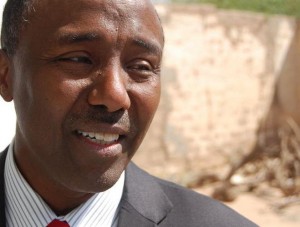Hargeysa, Somaliland – It’s a warm Thursday in late October in the capital of Somaliland. In observance of the Muslim day of prayer, government offices are closed on Friday, and many ease into the weekend by shutting down early on Thursday. Many officials are abroad, or away from their desks at vague “meetings.” Even the Ethiopian Liaison Office, the closest thing Somaliland has to an embassy, takes only the first 50 visa seekers and then closes its doors until Sunday.
Those Somaliland ministries represent the government of a place that calls itself a sovereign nation, and operates as such, but has not been recognized by any other country in the world.
Somaliland declared its independence from Somalia in 1991 and has been largely forgotten since, but now it might find itself at the center of an international scramble for the next oil hotspot. That has people including former BP PLC (LON:BP) chief executive officer Tony Hayward, who was disgraced for his response to the Deepwater Horizon oil spill in 2010, zeroing in on Hargeisa.
Somaliland has spent the past 22 years developing an infant democracy and a working government — something that’s markedly lacking in Somalia. Led by President Ahmed Mahamoud Silanyo since 2010, Somaliland is promoting itself as a safer destination for investors than the nearly-lawless Somalia. The difference between the two is visible.
 With higher officials already away for the weekend, many low-level bureaucrats head to open-air cafes to enjoy cups of sugary coffee served with Somali camel milk, before heading home. That they are able to do this safely in the open is a testament to Hargeisa’s security situation compared to that of Mogadishu, the Somali capital.
With higher officials already away for the weekend, many low-level bureaucrats head to open-air cafes to enjoy cups of sugary coffee served with Somali camel milk, before heading home. That they are able to do this safely in the open is a testament to Hargeisa’s security situation compared to that of Mogadishu, the Somali capital.
But while the rest of Hargeisa takes off work, in the Ministry of Energy and Minerals the atmosphere is different. Minister Hussein Abdi Dualeh and his staff work well into the afternoon, in part because their work is so important to the 4 million inhabitants of Somaliland. A major oil discovery would transform the local economy and shift geopolitics in the Horn of Africa. Indeed, during IBTimes’ visit in Hargeisa, a local journalist hovered about the ministry, just in case a major story broke. The geography of Somaliland, at the mouth of the Red Sea, favors oil export. Even the deepest part of the country is only a few hundred kilometers from a coastline that sits along one of the world’s busiest shipping routes.
Dualeh himself was already an old hand in the energy business, before becoming the oil minister for a rebel republic. He began his career as a salesman for the Abu Dhabi National Oil Company, just out of high school. After earning an engineering degree at the University of Oklahoma, his career shifted to California, where he worked with Chevron Corp. (NYSE:CVX) and then the California Metropolitan Transport Authority, gaining experience in both the upstream and downstream sides of the oil business. “I’m also a Californian,” Dualeh says with a smile.
Now, back in his native Somaliland, Dualeh thinks he is sitting on a fortune: Given its geology, he says, the region could hold several oil fields with reserves in the billions of barrels. In 1991, with Somalia on the verge of civil war, a World Bank/UNDP study noted that the northern part of the country was likely to contain significant hydrocarbon prospects. But as the central government dissolved in a spiral of violence, prospects for exploration vanished.
Even with relative calm in today’s Somaliland, exploiting those reserves would still be far from easy. Besides any other concerns oil companies may have in this highly unstable region of the globe, where piracy is rampant, Somalia’s government — whose authority does not extend much beyond Mogadishu, 500 miles (800 km) away by air — does not recognize the government of Somaliland, and has discouraged oil companies from doing any business with it.
Talks between Somalia and Somaliland began in April, and a new session is scheduled for November 8-10. Turkey will serve as both host and mediator for the meeting, which will touch on political and economic matters. This will be the third round of peace talks hosted by Turkey, featuring Somali President Hassan Sheikh Mahmoud and Somaliland’s Silanyo. Silanyo has expressed optimism about the upcoming round of talks, which are supported by the international community and grew out of the London Conference on Somalia held in February 2012. Dualeh, who in the past has been to Turkey as part of the dialogue process, spoke to IBTimes ahead of the November meeting.
IBT: What is the current state of oil and gas exploration in Somaliland?
We expect three or four international oil companies to begin 2D seismic exploration campaigns in Somaliland next year. We have signed a production-sharing [agreement with] Ophir Energy PLC (LON:OPHR), which is focused on Africa; with Genel Energy Plc (LON:GENL), which is headed by former BP chief executive Tony Hayward; with [United Arab Emirates-based] RAK Gas LLC; and with Australia-based Jacka Resources (ASX:JKA).
In addition, at the end of October, Sterling Energy PLC (LON:SEY) entered the Somaliland energy market, and there is also a Middle Eastern company that will be signing with us soon. When these companies have boots on the ground, it will really open up interest in Somaliland’s oil sector. Given the geology of the region, I think it is very likely when the 2D seismic [evaluation] is complete and drilling is done, we could be talking about billion-barrel “elephant” fields. That said, we don’t just hand out or allocate exploration licenses; we’re looking for companies in it for the long haul.
IBT: Turkish-British firm Genel announced last month it was leaving its five exploration blocs in Somaliland following two bombings in Mogadishu. How has Somaliland responded to this?
Genel did not walk away from Somaliland. That is a misconception. It temporarily halted its operations to hit the reset button on their operations here, and we have been working with them on how to resume operations. In a recent interview, Tony Hayward reiterated that Genel is very bullish about its blocks here and optimistic about the prospect of making a big discovery in Somaliland.
IBT: Yet clearly terrorism is a very real concern for potential investors, especially in light of those bombings. What can be done to address that?
Absolutely, it’s a very real concern, and absolutely the burden is on the side of Somaliland to provide a secure environment for the oil sector. Clearly the attack on [the] In Amenas [gas site] in Algeria this year demonstrates that the oil industry in Africa is a target for non-state actors. Thus, we will develop a separate military force fully trained and equipped and tasked with protecting the oil industry. It will have a separate command structure. Expanding their training and reequipping them is one of our main goals for next year, and we have contacted international security firms to assist in this. Now, unfortunately, we’re painted with the same brush as Somalia by a lot of people, but the fact is you as a foreigner can safely walk down the street in Hargeisa at midnight. This suggests our government already provides a general level of security and we will expand on this for expatriate workers.
IBT: With new talks between Somalia and Somaliland scheduled for next week, how do you respond to Somalia’s claim that deals between your government and oil companies are invalid?
We are really pretty clear in our communications with Somalia. There are no shared rights or interests between the two of us. International companies currently operating in Somaliland have signed agreements with us, not with Mogadishu. Some of these are publicly held companies with corporate boards and shareholders. These are companies [that] have done their homework and know who governs this territory.
Somalia is a different country. We don’t share politics or territory with Somalia. It’s just that simple. They are welcome to say whatever they want, of course, but the fact is we are a de facto state with 22 years of independence. At the same time, we have no resentment toward our brothers in Somalia and we are willing to cooperate on issues of regional interest like terrorism, anti-piracy and trade. These are interests we share with all of our neighbours, Djibouti, Puntland [which declared itself an autonomous region of Somalia in 1998] and Ethiopia.
IBT: Still, your state is not recognized by any country and many are hesitant to invest in such circumstances. Given this, what can Somaliland offer potential investors?
While some companies elsewhere in East Africa have already made discoveries, Somaliland is green fields. Once you have a discovery, cost for an operator to obtain a license goes up, so Somaliland is currently competitive in this way as well. We are willing to offer international oil companies terms as competitive as those signed elsewhere and we’re willing to ensure the sanctity of the production-sharing agreement contracts. The production-sharing agreements we have signed are written to international standards.
IBT: How does Somaliland fit in to the wider African oil scene at present?
Oil companies are taking a new look at East Africa. It’s not just Somaliland. The world is home to more than 900 potential oil basins, most of which have been poked by exploratory drilling over many decades. One of the few remaining underexplored regions is East Africa. You have had massive natural gas finds off the shores of Tanzania and Mozambique, and oil discoveries in Ethiopia, the Turkana region in Kenya, Madagascar and Uganda in the last decade. Somaliland is going to be a clear beneficiary of this activity, and unlike some of the inland places in Africa where oil is being found, you’re talking about the potential for fields here very close to the coast, where oil can be shipped easily to world markets. East Africa is currently the go-to region for oil exploration in Africa. It has the potential to become the new Middle East.
COURTESY: IBTIMES
























